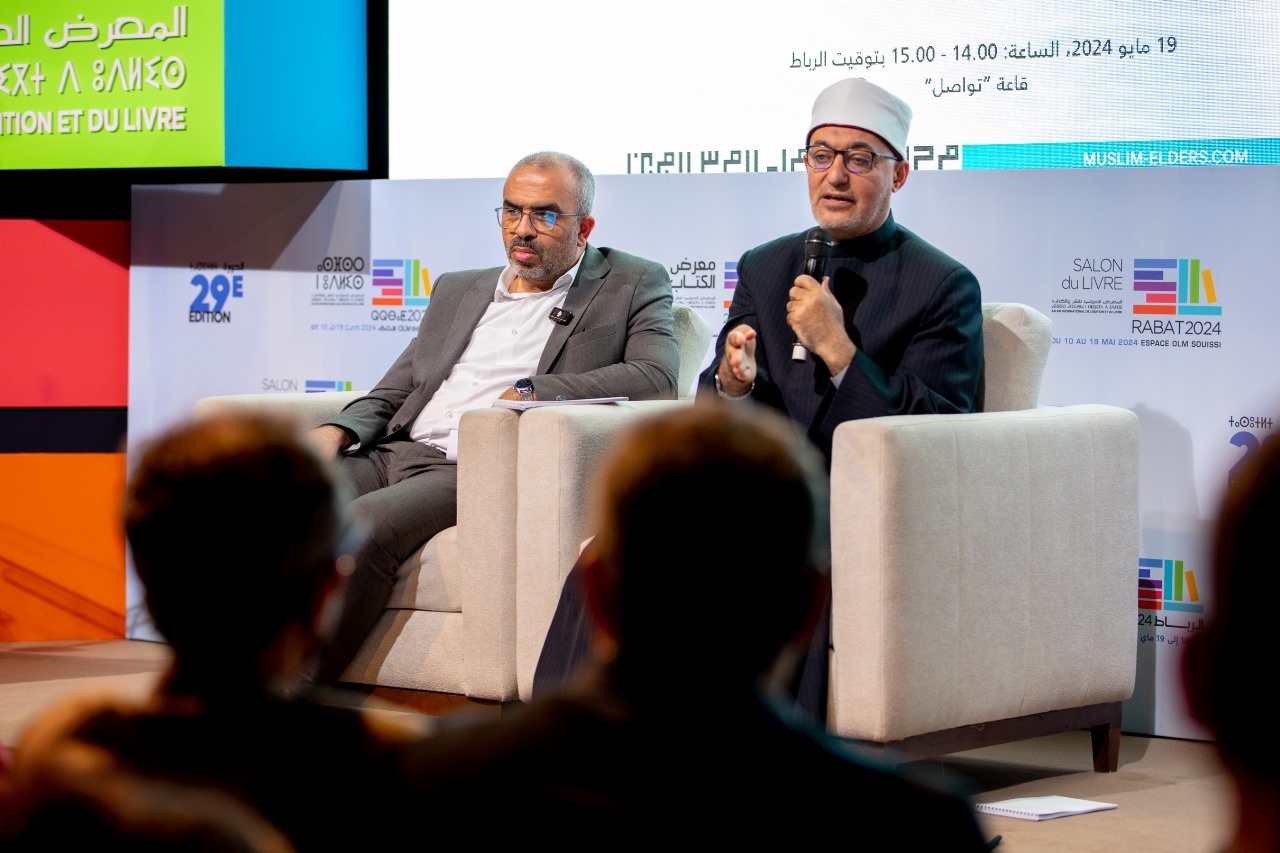إمكانات تجديد علم الكلام في ندوة ثقافية نظمها جناح مجلس حكماء المسلمين بمعرض الرباط الدولي للكتاب
الأمين العام لمجمع البحوث الإسلامية بالأزهر الشريف يشيد بالرؤية المستنيرة لمجلس حكماء المسلمين في مجال تجديد العلوم الإسلامية
عقد جناح مجلس حكماء المسلمين آخر ندواته الثقافية في معرض الرباط الدولي للكتاب بدورته الـ29 بعنوان: "إمكانات تجديد علم الكلام من خلال تجربة ذاتية"، قدمها فضيلة الأستاذ الدكتور نظير عياد، الأمين العام لمجمع البحوث الإسلامية بالأزهر الشريف، وأدارها د. سمير بودينار، رئيس مركز الحكماء لبحوث السلام؛ حيث تناولت الندوة العديد من المحاور المهمة التي تسلط الضوء على الإمكانات الكامنة في تجديد علم الكلام، وذلك من خلال استعراض التجارب الذاتية والمقاربات الحديثة في هذا المجال.
في بداية الندوة، أشاد فضيلة أ. د.نظير عياد، الأمين العام لمجمع البحوث الإسلامية، بالجهود الرائدة لمجلس حكماء المسلمين في دعم مجال التراث الكلامي بشكل عام، من خلال تطبيق رؤية مستنيرة، ونهج متجدد يُراعي مقتضيات العصر الراهن، مؤكدًا أن التجديد في علم الكلام ضرورة حياتية، ومطلب إنساني، وحضاري، وإسلامي، ويعد من باب الفروض لدى المعنيين به، والمنتسبين إليه، والمشتغلين به.
وأكد فضيلته أن علم الكلام يعني بالدين كله من حيث "الأصول"، و"الفروع"، وقد أوضح فضيلة الإمام الأكبر أ. د. أحمد الطيب، شيخ الأزهر الشريف رئيس مجلس حكماء المسلمين؛ أن الفقه هو الفهم في الدين، الذي يتكون من جزئين؛ أولهما يتعلق بأمور العقيدة، أو الأصول، والجزء الآخر يتعلق بالأمور العملية أو المسائل الفرعية وهو الفقه بمعناها العام المعروف، موضحًا أن التراث الكلامي أو "العقدي" في حاجة إلى التطوير، والبناء عليه، وذلك من خلال التجديد في العلم، بما في ذلك الوسائل والأدوات، وفي آليات الطرح، وطرق التعاطي مع التراث الكلامي الغني.
وأشار د. نظير عياد إلى أن الحديث عن تجديد علم الكلام لا يُراد منه إهمال التراث الكلامي، أو التطاول عليه، أو التقليل من شأنه، أو الطعن فيه، بل المراد هو التعاطي مع هذا التراث، من خلال القراءة، والبحث، والاستقراء، والنقد، والاستيعاب، حتى يكون أساسًا لبناء جديد يواكب المستجدات الحديثة؛ حيث إن الواقع الحياتي الراهن يفرض إعادة النظر في الموضوعات "التقليدية" لعلم الكلام، فضلًا عن ظهور قضايا جديدة تحتاج الى نظر مستأنف في التعامل معها.
وفي ختام الندوة أكَّد فضيلة الأمين العام لمجمع البحوث الإسلامية في الأزهر الشريف، أن علم الكلام عبر تاريخه الطويل استطاع أن يكون أحد ركائز الحضارة الإسلامية، وذلك بما هيأه من انفتاح عقلي، وتجاوب فكري، من خلال السجالات الفكرية التي دارت بين المسلمين، وغيرهم عبر التاريخ، مما أسهم في إثراء قيم التعايش السلمي بشكل خاص، والفكر الإنساني بشكل عام.
من جانبه ، أوضح د. سمير بودينار، أن موضوع تجديد علم الكلام من القضايا الراهنة التي تستأثر باهتمام مجلس حكماء المسلمين؛ نظرًا إلى الحاجة الملحَّة اليوم إلى تجديد الفكر الديني بشكل عام، وعلم الكلام بشكل خاص، من أجل مواجهة التحديات الفكرية والمعرفية الحديثة، وبما يتناسب مع تطورات العصر.
واختتم جناح مجلس حكماء المسلمين، فعالياته الثقافية بمعرض الرباط الدولي للكتاب الذي عُقدَ في الفترة من 9 حتى 19 مايو الجاري؛ قدم فيها أكثر من 220 إصدارًا بـ 5 لغات مختلفة، منها 22 إصدارًا جديدًا، تعالج أبرز القضايا الفكرية والثقافية المهمة، بالإضافة إلى تنظيم عدد من الجلسات النقاشية والثقافية، تناولت قضايا السلم والعنف في المجتمعات والشعوب، ومستقبل النشر والترجمة في مجال القضايا الإنسانية، وفكرة السِّلم في بدايات النهضة الأوروبية، فضلًا عن أسباب الافتراقات التاريخيَّة في تاريخ الأمة الإسلامية، والتحديات التي قد تنشأ عن اختلافات الهوية داخل المجتمعات المسلمة سبل تطبيق الإستراتيجيات الفعَّالة لمعالجتها.

